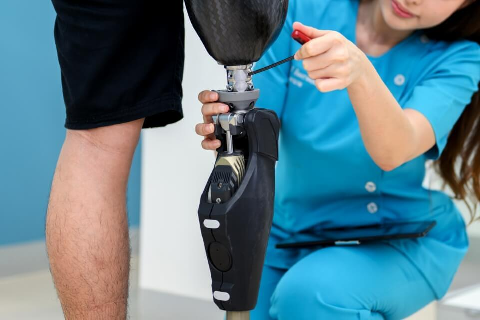- Home >
- Amputation Claims
Losing a limb is a life-changing event in any circumstance. Knowing that it could have been prevented through better medical care makes an already difficult situation that much harder to come to terms with.
We understand how an amputation can hurt your independence and identity. That’s why our specialist amputation solicitors treat your claim with the utmost professionalism and compassion. Backed by over 30 years of experience and a strong track record, trust us to secure the compensation you need to adjust to your new lifestyle.

Do you have an amputation compensation claim?
Sometimes having a limb amputated is a patient’s only option following an illness or accident. But mistakes do happen, and numerous amputations are sadly caused by poor medical treatment, from surgical errors and infections caused by surgery, to misdiagnosis and avoidable delays in treatment.
If you or a loved one’s amputation could have been prevented, you have a right to justice. Our expert medical negligence solicitors advise you every step of the way, helping you recover compensation for prosthetics, mobility aids, home adaptations and more.

The specialist amputation claims solicitors for Essex & East Anglia
Since 1993, our trusted legal advice has guided hundreds of people affected by an avoidable amputation to recover millions in compensation.
As a truly specialist medical negligence firm, our solicitors have the knowledge and experience to fully investigate your amputation claim and negotiate the best possible settlement. With 96% of our cases resolved outside of court on a strict ‘no win, no fee’ guarantee, we empower you to pursue your claim with absolute reassurance and zero financial risk.
What does our amputation claim process look like?

A free initial consultation
Call us, request a callback or complete our online form and we’ll assess if you have a valid medical negligence claim.

Funding your claim
Discover the ways we can fund your claim without you paying a penny at any stage of the process.

Investigating evidence
We gather medical records, witness statements and more to learn what happened to you and prove your claim.

Instructing independent medical experts
We work with impartial, experienced medical experts to establish whether your injuries were due to substandard medical care.

Valuing your claim
We assess your health and financial losses to accurately estimate how much compensation your claim is worth.

Presenting your case
We contact the Defendants and the Courts on your behalf to set out your allegations and receive a response.

Negotiating a settlement
We work to achieve a fair settlement for you outside the courtroom – this is how 96% of our cases end.

Preparing for Trial
If we must proceed to Trial, we fully prepare you for what to expect so you receive the right result in court.
FAQs about amputation claims
What is an amputation negligence claim?
An amputation negligence claim is when you seek compensation from one or more medical professionals for an amputation caused by substandard treatment.
To reach the right outcome, a claim involves gathering evidence and consulting relevant medical experts to prove that the medical care you received was negligent and that this directly caused your amputation.
A claim can also provide answers to what happened and demonstrate how better treatment could have led to a more positive outcome for you or your loved one.
What types of amputation can you make a negligence claim for?
An amputation generally affects a person’s extremities, such as their legs, feet, toes, arms, hands and fingers. Losing any of these body parts can be grounds for a medical negligence claim – it does not only apply to losing a major limb.
How can clinical negligence cause an amputation claim?
Sometimes amputation is the only way to save someone’s life following a serious injury or illness. However, an amputation may be prevented through faster or better-quality medical care.
Examples of clinical negligence that can lead to an amputation include:
- Mismanagement or misdiagnosis of diabetes
- Mishandling or delayed treatment of crush injuries
- Misdiagnosis or delayed treatment of cancer
- Misdiagnosis or delayed treatment of meningitis
- Misdiagnosis or delayed treatment of sepsis
- Misdiagnosis or delayed treatment of infections and vascular disease
- Surgical errors such as severing nerves or damaging surrounding tissue
- Misdiagnosis or delayed treatment of DVT (Deep Vein Thrombosis) or similar circulatory conditions
- Inadequate post-operative care
- Untreated pressure sores
An amputation negligence claim can also be pursued if a surgeon makes mistakes during an amputation procedure, such as amputating the wrong limb or amputating either too much or too little of the affected extremity. These incidents would also be classified as ‘Never Event’ claims.

How do I know if I have a valid amputation compensation claim?
To establish whether you have a legitimate amputation compensation claim, we must answer three important questions:
- Did a medical professional breach their duty of care to you during your treatment?
- Did you suffer excessive injury, suffering or loss as a result of your treatment?
- Was your medical professional’s breach of duty the direct cause of your amputation?
For your claim to be considered valid, it must meet all three criteria. If it does not meet one or more of the above questions, then you do not have grounds for a claim.
At Gadsby Wicks, our highly experienced solicitors have a strong track record of managing amputation claims, enabling us to give you an accurate, honest answer as to whether your claim is likely to succeed.
As part of our comprehensive legal claims process, we will:
- Arrange a free initial consultation to discuss your situation
- Set you up with your dedicated solicitor to personally oversee your case
- Gather all relevant evidence to reinforce your claim
- Consult with independent medical experts
- Contact the Defendant, assess their response and advise on your next steps
- Negotiate with the Defendant to reach a fair settlement
- Prepare you for your court hearing should your case proceed to trial
To find out if you have a potential amputation compensation claim, answer a few short questions on our dedicated “Do I have a claim?” form.
What evidence is required to prove an amputation negligence claim?
It can often be hard to prove that an amputation was directly caused by medical negligence. You must determine when it became impossible to prevent the amputation, and whether one or more healthcare professionals could have acted before this.
We work with independent medical experts to examine your case and establish the latest possible time an amputation could have been prevented. While it is virtually impossible to pinpoint the exact date and time, our experts can estimate this against the Balance of Probabilities, which is the standard required to prove causation.
In addition to receiving medical expert reports, examples of evidence we may use to prove your claim include:
- Medical records
- Witness statements
- Your personal statement
- Photographs
For this reason, we will often seek to establish the cause of your amputation before we investigate the duty of care. This is helpful for two key reasons:
- Several healthcare professionals may have seen the claimant both before and after the point of no return, so this helps to determine who can be considered liable
- It will inform us whether an amputation could have been prevented by the time you first visited a healthcare professional, or if it was already too late
What impact can an amputation have on your life?
An amputation can change your life in many different ways. While prosthetic limbs can help increase your functionality, it often takes a long time to adjust to these new limitations and lifestyle changes. Even the simplest tasks, like picking up a shopping bag or kicking a ball, may no longer be possible.
Psychological impact
Changes to your physical capabilities, movement and routine can cause significant psychological harm, as you may struggle to come to terms with your limitations. An amputation can also negatively impact both your self-esteem and body image, with the sudden loss of independence affecting your dignity and self-worth.
Work and loss of earnings
Losing a limb may mean you can no longer perform your current job or approach it differently. For example, you may find it harder to do long shifts at work due to your prosthetic leg, or require more regular breaks to manage your discomfort. This can affect how much you earn and your future job opportunities.
Getting to and from work may also be challenging. Travelling via bus or train can be harder if you now use crutches or a wheelchair. If you drive to work, you may need to buy a specially adapted vehicle.
Life at home
You may find that once-simple actions, such as climbing the stairs or bathing, can become significantly more challenging following an amputation, or impossible without assistance. Your home may also not be properly equipped to support your limitations.
Social life and relationships
From no longer being able to take part in beloved hobbies, to losing the spontaneity to go out at any point in time, an amputation can drastically impact your social life. This may also extend to current and future relationships, as a lost limb could mean you are now more self-conscious about your appearance.
Fundamentally, an amputation can influence every aspect of your life moving forward, which is why we work tirelessly to secure the financial security you need to limit its impact on your quality of life.

Contact our expert amputation claims solicitors
If you or a loved one lost a limb due to a medical mistake, speak to someone about your options. Our team is here to listen and advise you on your next steps.

Lexcel accredited medical negligence claims solicitors
We are proud to be a Lexcel-accredited practice. The accreditation is a mark of quality and comes directly from the Law Society.
A recent assessment described us as a “Centre of Excellence” and we continue to operate to the highest standards across all main areas of our field. These include client care, case management, financial management, structure and strategy, people management, risk management, information management and file management.







